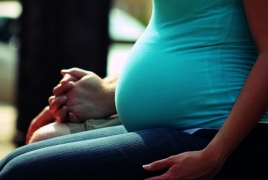
Side effects of prescription drugs are of particular concern during pregnancy.
Two medicines used to control epileptic seizures -- and prescribed to patients with migraine, pain and bipolar disorder -- are associated with an increased risk of birth defects, new research indicates, according to CNN.
Women who took valproic acid or topiramate in the early months of their pregnancies had a higher-than-usual chance of having babies with birth defects, including spina bifida and cleft lip, according to a study published Wednesday in Neurology.
Anti-epileptic drugs, particularly the newest ones, are increasingly prescribed for medical conditions unrelated to epilepsy.
Prevalence of epilepsy medicine use for any reason during pregnancy is reported as 21.9 per 1,000 expectant women in the United States, 6.7 per 1,000 in France and 4.3 per 1,000 in the Netherlands, according to a 2018 study cited by the researchers.
For the study, researchers used data from the French national health care system to identify pregnancies that resulted in live births between January 2011 and March 2015. Among the 1,886,825 pregnancies, the researchers looked for the mothers' use of 10 anti-seizure drugs before and after conception and searched for 23 birth defects in the children born to these women.
A total 8,794 women had been prescribed a single anti-epileptic drug, the researchers found.
Women prescribed valproic acid (10.4% of the group of pregnant women prescribed anti-epileptic medication) had a 19 times greater risk of having a baby with spina bifida compared with women who did not take an epilepsy drug. Among the 913 women prescribed valproic acid, six babies (0.66%) had spina bifida, compared with 616 babies (0.03%) born to women not taking an epilepsy drug. Valproic acid also increased the risk of seven other birth defects, including cleft palate and four types of heart defects.
Women prescribed topiramate (5.9%) had a seven times greater risk of having a baby with cleft lip (with or without cleft palate), the study indicated. Among the 517 women prescribed topiramate, three babies (0.60%) had cleft lip, compared with 1,637 babies (0.09%) born to women not taking an epilepsy drug.

